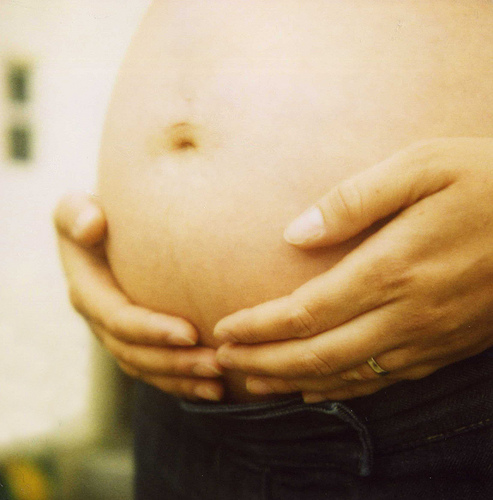Before pregnancy, women should have normal body weights. This is to ensure well-being of the pregnant mother and for the healthy development of the fetus. This is the same reason why couples need to plan for a pregnancy—not only financially or emotionally but more importantly, physically.A pregnant woman should always keep in mind that she is not only eating for herself but also nurturing for two people. People would normally think that nutrition is a personal thing, affecting only one’s life. A pregnant woman’s nutritional status is critical and has a very big impact on the nutrition of her baby. Prior to pregnancy, nutrition is utmost important to ensure a healthy uterus and placental formation.
During Pregnancy
 [/caption]
[/caption]
The uterus’ health will determine the capability to support the development of placenta during the first month of gestation. The placenta is the oxygen, nutrition and blood supply of the fetus and also has the function for waste removal for the growing fetus. This is where the maternal and fetal blood circulate in close proximity and exchange materials. This is where the fetus gets his nutrients while the mother’s blood picks up the carbon dioxide and other waste materials of the growing fetus to be excreted through her lungs and kidneys. On the onset of the first trimester of pregnancy, the woman needs not to increase her caloric needs but needs to add more calories for the next six months. An underweight woman who fails to gain appropriate body weight throughout the pregnancy will most likely have a baby with a low birth weight. The infant’s birth weight is very significant to the future health of the child. This is the very reason why it is a protocol to all hospitals and birthing institutions to weigh the infant after birth.
A pregnant woman’s daily caloric intake should have an increase of 300 calories. This totals to 1900 to 2500 calories a day for a pregnant woman with a normal body weight. It is recommended that the carbohydrate intake be about 50 percent of the energy intake. This means that in a daily 2000 calorie intake, the 1000 calories of it should come from carbohydrate intake. Carbohydrates are the first line source of energy from foods. An unpregnant woman needs an intake of 45-50 grams of protein per day while a pregnant woman needs an intake of 60 grams. All pregnant women needs to spare their protein in the body by increasing the carbohydrate intake.
The increase of caloric intake should come from healthy foods and not from junk foods. Junk foods have empty calories making you only gain weight without the needed nutrition to keep you healthy and full of life.
Keep in mind that body weight should be proportional with your height. That is why visiting your health care provider is a must to monitor every month your weight and nutritional progress.
Pregnant teenagers, physically active women and underweight women needs to add more calories to attain ideal body weight
Nutrition to Prevent Pregnancy and Delivery Complications
A healthy nutritional status would equate to a healthy and comfortable pregnancy and delivery also. Deficiencies in nutrition, coupled with low birth weight is the underlying cause of more than half of all the deaths worldwide of children under five years of age. Not all cases are from nutritional deficiencies of the infant and the mother during pregnancy. Some deaths can also be caused by substance abuse, genetics, diseases and infection. However a woman can make a very big difference by just keeping a healthy nutrition. You are what you eat and now that you are eating for two, you should double up the care.
 Obese women are also encouraged to attain appropriate weights during pregnancy. This is also to prevent pregnancy and delivery complications. Obese women are most likely to have eclampsia and diabetes during pregnancy. Obese pregnant women are most likely to have macrosomic babies. Macrosomic babies are those that have excessive birthweight. When this becomes the case, it would be a lot necessary for the ob-gyne to perform a caesarian operation because the baby cannot pass through the woman’s pelvis. Keep in mind that an invasive procedure such as an operation can pose more complications.
Obese women are also encouraged to attain appropriate weights during pregnancy. This is also to prevent pregnancy and delivery complications. Obese women are most likely to have eclampsia and diabetes during pregnancy. Obese pregnant women are most likely to have macrosomic babies. Macrosomic babies are those that have excessive birthweight. When this becomes the case, it would be a lot necessary for the ob-gyne to perform a caesarian operation because the baby cannot pass through the woman’s pelvis. Keep in mind that an invasive procedure such as an operation can pose more complications.
Dieting during pregnancy is not recommended as it can pose harm to the developing fetus. Even an obese woman should gain about 15 pounds more for the best chance of delivering a healthy baby. Women who are carrying twins should strive for an appropriate weight gain of 35 to 45 pounds.
